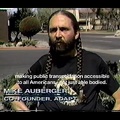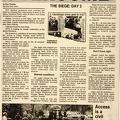[This article continues in ADAPT 422 but the entire text of the article is included here for easier reading.]
Title: MUC police arrest 20 on Day 2 of protests by wheelchair activists
By: Susan Semenak, of The Gazette
10/4/88
Large contingents of Montreal Urban Community police were mobilized yesterday for the second day in a row to deal with wheelchair protesters who were demonstrating for better public transit facilities for handicapped people.
Twenty protesters were arrested, 10 in a demonstration atop Mount Royal and 10 who chained themselves to the doors of the under-parking garage at Place Ville Marie, across the street from the Queen Elizabeth Hotel, where the American Public Transit Association — the protesters' target — is holding its convention.
Most of the demonstrators were members of ADAPT — American Disabled for Accessible Public Transit.
In the demonstration on the mountain, 35 protesters tied up 100 specially trained police for about four hours yesterday afternoon.
[Subheading] Refusing to clear road
Ten were arrested after refusing to clear the road leading to the Mount Royal chalet, where the transit association had organized a lunch.
After pleading guilty in municipal court last night to charges of mischief and obstructing police, five demonstrators paid fines of $50 while five others refused, to pay and were sent to jail for three days.
A mother and her 12-year-old daughter were released after the Place Ville Marie protest. The eight other activist pleaded guilty to charges of mischief and obstructing police. All eight chose to go to jail for three days rather than pay $50 fines.
[Subheading] Placed on probation
All those who pleaded guilty yesterday were placed on probation until the convention ends Thursday.
Judge Louis Jacques Leger barred them from the island of Montreal and from demonstrating and banned them from the mountain and from a wide downtown area around the Queen Elizabeth Hotel.
Police said last night that of the 48 activists arrested yesterday and Sunday, only one was a Quebecer.
Protest organizer Rev. Wade Blank of Colorado told Leger. "I am personally grieved and saddened that this court has chosen to punish people who have already been greatly punished by society."
Const. Normand Tremblay said the Montreal Urban Community police were out in full force yesterday to prevent the wheelchair protesters from repeating the disturbance they had caused Sunday, when they chained themselves to railings at the Sheraton Centre hotel and blocked traffic on Dorchester Blvd. for nearly two hours.
Twenty-eight of the handicapped activists were arrested Sunday. After pleading guilty to mischief charges, five paid $25 fines and were released, while 23 others opted to serve three-day jail terms at Bordeaux and Tanguay jails. "We are joining our friends in jail and it's worth it," said Lillibeth Novaro, one of those arrested on the mountain yesterday, as a policeman wheeled her to a school bus hired to take the protesters to police headquarters and municipal court. "There are millions of people in wheelchairs who need to take the bus to go to work and be equal members of society," she said. Novaro ended up paying her $50 fine and didn't go to jail.
'We want equal access'
"We pay taxes like everybody else and we want equal access to mass transit," said Molly Blank, who drove four days from Colorado with her husband and 18-year-old handicapped daughter to join the protest. Police blocked roads leading to the chalet and the lookout atop the mountain with barricades and patrol cars to prevent the protesters from confronting the luncheon guests. The police force's tactical squad had been tracking the demonstrators' movements since morning. Urgences Sante doctors were on hand to verify that none of the protesters had been injured during the arrests. "We know these people are here to cause problems and we are here to prevent that," Tremblay told reporters as a helicopter the MUC had rented for the day from provincial police hovered overhead. "We are allowing them to protest and express themselves, but we cannot allow them to make trouble. And we want to take all the necessary precautions to ensure that nobody is injured”.
The special police team assembled to deal with the protesters took a day-long course last week to learn how to "handle" the handicapped — from identifying disabilities and deactivating wheelchairs to carrying the disabled without injuring them. Tremblay said police consulted their counterparts in six U.S. cities where the group has staged previous demonstrations. Phyllis Young, a transit official from Duluth, Minn., who attended the luncheon on Mount Royal, said the wheelchair protesters have been turning up at public transit conventions for the past five years. "This is nothing. In San Francisco they chained themselves to trolleys and ran over one policeman in their wheelchairs and gave him a concussion," Young said.
"Another year they all laid down on the street and blocked traffic for a whole day." Tremblay said police could not stop the protesters from coming to Montreal because they have no criminal record — the only laws they had broken are municipal bylaws. Instead, MUC police smiled and chatted as they wheeled the protesters away. But some had donned kneepads under their uniforms in case the protesters became aggressive. Maria Barila, a Montrealer arrested on the mountain, said officials at the Office des personnes handicapes du Quebec — the government agency that oversees services to the disabled — discouraged local disabled people from turning out at the demonstrations. "Some people were told they could lose their welfare cheques," said Barila. "Others were told that things could get violent."
Francois Gagnon, also of Montreal, said specialized buses for the handicapped provided by the Montreal Urban Community Transit Corp. are "a joke." He said the disabled would prefer to ride the same buses and Metros as everyone else. “They call It door-to-door service, but sometimes it takes two hours for a disabled person to get from home to work in those mini-vans they provide," said Gagnon, winding his way up the mountain in his wheelchair.
Meanwhile, Murielle Lariviere-Lebret, president of the Adapted Transport Users Association, said her group morally supports ADAPT protesters demanding accessible transport for all. But her group, which speaks on transit for 18 associations of the handicapped here, would not join demonstrations or urge members to do so. Instead, it prefers to concentrate on getting more and better minibuses and taxis to serve handicapped commuters in the MUC. Over the longer term, it favors adapting the regular bus and Metro service so it is accessible to the handicapped.
[Subheading] Position denounced
This position was denounced by Jean-Francois Gagnon, a member of the Quebec Association of Handicapped Consumers, who said the handicapped had to become more radical to get what they want from the MUC and Quebec. But MUCTC managing director Louise Roy said the transit corporation has no intention of adapting buses or Metro stations to accommodate the handicapped. "Our intention was never to make the Metro system completely accessible she said.
"We are working on improving our adapted door-to-door service, and I think that's much more realistic." Adding wheelchair-lift platforms on regular buses would cost $15,000 per bus, which Roy said is too expensive. Instead, the MUCTC will spend $16,000 on improving adapted transit services next year. "Each year our ridership on adapted transit increases by 30 per cent. Last year we served 500,000 people," she said. Service is offered through adapted mini-buses and taxis. Riders pay the same price they would to ride a bus and the rest of the cost is absorbed by the MUCTC, Roy said.
- Author
- The Gazette/ Susan Semenak
- Created on
- Thursday 11 July 2013
- Posted on
- Thursday 18 January 2018
- Tags
- ADAPT - American Disabled for Accessible Public Transportation, Adapted Transport Users Association, APTA - American Public Transit Association, arrests, Bordeaux jail, court, door to door, fines, Francois Gagnon, helicopters, intimidation, jail, Lillibeth Navarro, local people with disabilities, Louise Roy, Maria Barila, Maria Barille, Molly Blank, Montreal, Mount Royal, Murielle Lariviere-Lebret, Office des personnes handicapes du Quebec, protest, Quebec Association of Handicapped Consumers, special police training, Tanguay Women's prison
- Albums
- Visits
- 1920
- Rating score
- no rate
- Rate this photo


0 comments